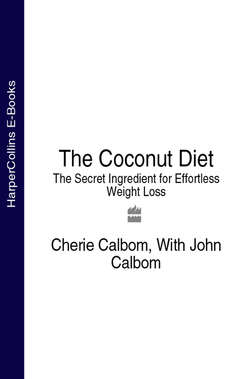Читать книгу The Coconut Diet: The Secret Ingredient for Effortless Weight Loss - Cherie Calbom - Страница 9
Complex Carbohydrates: The Good Ones
ОглавлениеThe complex carbohydrates (polysaccharides) are condensed into molecules of starch, glycogen and cellulose. Starch molecules are rather large; a single starch molecule may contain 3,000 or more glucose units linked together. Starch is the stored form of glucose in a plant. Potatoes, rice and other grains, corn, and legumes are examples of starch. Glycogen is more complex than starch and is found in animal meats, to a limited extent. Cellulose is found primarily in plants and has long, branching chains that are not digestible by human enzymes. Cellulose is also known as insoluble fiber and it is very important in human nutrition, especially for colon health.
Most plant foods have fiber and an abundance of nutrients particularly the brightly colored vegetables, fruit, sprouts, legumes, herbs, and sea vegetables. These are powerhouses of vitamins, minerals, enzymes, phytochemicals, and fiber. Even on a carb-restricted diet, we can eat large amounts of most vegetables, salad greens, and sprouts and never feel deprived, while maintaining a low-carb intake. The high-fiber content of these foods slows down the rate that sugars enter the bloodstream, thereby lowering insulin secretion. These vegetables, sprouts, herbs, and salad greens will be your primary source of carbohydrates during the first three weeks of the Coconut Diet.
A few vegetables and fruits such as potatoes, parsnips, watermelon, pineapple, and bananas are not good-carb choices because they are higher on the Glycemic Index; they should be avoided especially in Phases I and II.
Sweeteners: The Good, the Bad, and the Dangerous
Sweeteners, no matter what we call them, are still sugars. Very few sugars are actually good for us such as fructooligosaccharides and other essential saccharides. But these sugars are rarely, if ever, found in snacks and treats; they are mostly used for medicinal purposes.
Most natural sweeteners such as honey and pure maple sugar are a little better than refined sugars, in that they have some nutrients and they aren’t bleached and refined, however, they are not healthful in the quantities consumed by the average person. And some sweeteners, namely artificial, can even be dangerous.
Sugar may have many detrimental effects on the body. One is suppression of the immune system. Here’s how it works: vitamin C has a similar structure to glucose and they compete with one another. In the 1970s, scientists found that vitamin C was needed by white blood cells so they could phagocytize (engulf and digest) bacteria and viruses. White blood cells require about fifty times more vitamin C on the inside as the outside and sugar completes with vitamin C for entry into white blood cells.2
Sugars can also contribute to a condition known as candidiasis (overgrowth of yeasts known as Candida albicans). A diet rich in carbohydrates stimulates yeast growth. When we eat sweets and other simple carbs, we feed the yeast in our digestive tract, which can cause them to multiply rapidly. Weight gain and a host of illnesses and adverse symptoms are attributed to candidiasis.
If you crave sweets, breads, potatoes, or any other form of carbs, we suggest you fill out the Candida Questionnaire to help determine if you have an overgrowth of yeast in your body. Unless you deal with yeasts, you may never be able to lose the weight you want. The late Dr. Robert C. Atkins said that about 20 percent of the people on the Atkins Diet would not be able to lose weight because of yeasts.3
Overeating sugar can also lead to insulin resistance, which contributes to weight gain and a host of physical ailments including autoimmune disorders such as arthritis and multiple sclerosis, some forms of cancer, candidiasis, celiac disease, chronic fatigue syndrome, depression, Type II diabetes, digestive disorders, heart disease, hyperlipidemia, hypertension, infertility, obesity, panic and anxiety attacks, hypoglycemia, and polycystic ovarian syndrome.
I consider Candida albicans a blessing, actually, because it was the only thing that motivated me to go off sugar and [onto] a low-carb diet. In the process, I lost 100 pounds!
Marie
